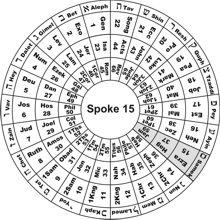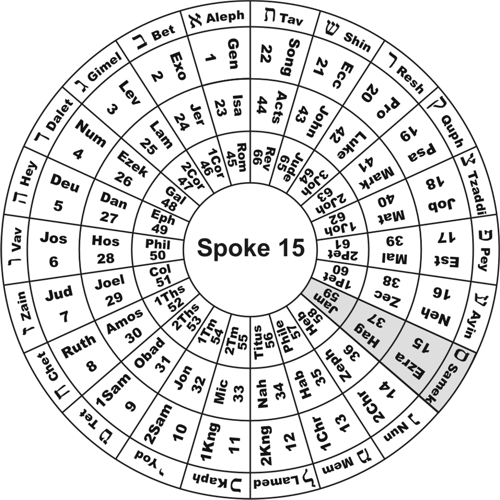Spoke 15 - Samek - Three Decrees of Support
The Decree of Support from Cyrus
Now in the first year of Cyrus king of Persia, that the word of the LORD by the mouth of
Jeremiah might be fulfilled, the LORD stirred up the spirit of Cyrus king of Persia, that he made a proclamation throughout
all his kingdom, and put it also in writing, saying, Thus saith Cyrus king of Persia, The LORD God of heaven hath given
me all the kingdoms of the earth; and he hath charged me to build him an house at Jerusalem, which is in Judah. Who is
there among you of all his people? his God be with him, and let him go up to Jerusalem, which is in Judah, and build
the house of the LORD God of Israel, (he is the God,) which is in Jerusalem. And whosoever remaineth in any place where
he sojourneth, let the men of his place help him with silver, and with gold, and with goods, and with beasts,
beside the freewill offering for the house of God that is in Jerusalem. Then rose up the chief of the fathers
of Judah and Benjamin, and the priests, and the Levites, with all them whose spirit God had raised, to
go up to build the house of the LORD which is in Jerusalem.
And all they that were about them strengthened their hands with
vessels of silver, with gold, with goods, and with beasts, and with precious things, beside all that was willingly offered.
Also Cyrus the king brought forth the vessels of the house of the LORD, which Nebuchadnezzar had brought
forth out of Jerusalem, and had put them in the house of his gods; Even those did Cyrus king of Persia bring forth by
the hand of Mithredath the treasurer, and numbered them unto Sheshbazzar, the prince of Judah.
Ezra 1:1ff (Spoke 15, Cycle 1)
This opening passage of Ezra defines the primary theme of his whole Book. It begins with a royal decree from the Persian king Cyrus
commanding full support for the building of the Temple, including the specific supply of five named commodities
(silver, gold, goods, beasts, precious things), in addition to all that was freely offered. And as if this were not enough,
Cyrus also ordered his treasurer to return the vessels that belonged in the house of the Lord. In every way, Cyrus fulfilled the
symbolic meaning of Samek (Support) with respect to the rebuilding of the Temple. Yet his was only the first of three decrees by
Gentile kings that God raised up to supply the needs to rebuild His Temple and His city Jerusalem.
The Decree of Support from Darius
Now when the adversaries of Judah and Benjamin heard that the children of the captivity
builded the temple unto the LORD God of Israel ... [they] weakened the hands of the people of Judah, and troubled
them in building, And hired counselors against them, to frustrate their purpose, all the days of Cyrus king of Persia,
even until the reign of Darius king of Persia.
Ezra 4:1ff (Spoke 15, Cycle 1)
The project to rebuild the Temple was persistently hindered by local inhabitants who had filled the vacuum
left by the Babylonian Exile. God therefore raised up the prophets Haggai, Zechariah, and Zerubbabel in the
second year of Darius to renew the effort. Again, it was opposed by the locals who asked "Who commanded you to
build this house and to make up these walls?" (Ezra 5:9). They either did not know or did not believe that Cyrus
had given a decree, so they wrote to Darius asking that "there be a search made in the king's treasure house, which
is there at Babylon, whether it be so, that a decree was made of Cyrus the king to build this house of God at Jerusalem" (Ezra 5:17).
Darius searched the House of Books (Bet Sepharim) and found the original decree of Cyrus, and decided to write his own:
... Let the governor of the Jews and the elders of the Jews build this house of God in his place.
Moreover I make a decree what ye shall do to the elders of these Jews for the building of this house of God:
that of the king's goods, even of the tribute beyond the river, forthwith expenses be
given unto these men, that they be not hindered. And that which they have need of, both young
bullocks, and rams, and lambs, for the burnt offerings of the God of heaven, wheat, salt, wine, and oil, according to
the appointment of the priests which are at Jerusalem, let it be given them day by day without fail: ...
I Darius have made a decree, let it be done with speed.
Ezra 6:7ff (Spoke 15, Cycle 1)
As with Cyrus' original edict, this decree from Darius was more than a mere building permit. He commanded full
support for all aspects of the building project, including money from the tribute he received from Jerusalem "beyond the river" and
he even topped it off with threats of utter destruction to anyone who would dare oppose the project. As with Cyrus,
Darius fulfilled the symbolic meaning of Samek to the Letter (pun intended).
Taxes, Tolls, and Tributes: Governmental Support
This is the copy of the Letter that they sent unto him, even unto Artaxerxes the King ... Be it known unto
the king, that the Jews which came up from thee to us are come unto Jerusalem, building the rebellious and the bad city,
and have set up the walls thereof, and joined the foundations. Be it known now unto the king, that, if this city be builded,
and the walls set up again, then will they not pay toll, tribute, and custom, and so thou shalt endamage the
revenue of the kings.
Ezra 4:11ff (Spoke 15, Cycle 1)
After Darius died, the opponents to the rebuilding of Jerusalem renewed their efforts by writing to king Artaxerxes.
The support of any government derives primarily from money collected in the form of taxes, tolls, tributes and customs.
This is how regimes run today and it is how they ran in the days of Ezra. Any threat to their money supply would instantly cause
alarm. Those opposed to the rebuilding of Jerusalem used this tactic to convince Artaxerxes to order a stop to the work
of restoration. They argued that allowing the Jews to continue building would threaten the king's monetary support received through
governmental taxes, and so the king commanded that the work cease "until," said the king, "another commandment is given by me" (Ezra 4:21).
The Decree of Support from Artexerxes
Now this is the copy of the Letter that the king Artaxerxes gave unto Ezra the priest, the scribe, even a scribe
of the words of the commandments of the LORD, and of his statutes to Israel. Artaxerxes, king of kings, unto Ezra the
priest, a scribe of the law of the God of heaven, perfect peace, and at such a time. I make a decree, that
all they of the people of Israel, and of his priests and Levites, in my realm, which are minded of their own freewill to go
up to Jerusalem, go with thee.
Ezra 7:11ff (Spoke 15, Cycle 1)
When King Artaxerxes did give another commandment, it was not merely another in sequence, it was another of an
entirely different kind. Something had happened and his heart was now enthusiastically devoted to the
full, abundant,
and overflowing support for the maintenance of the Temple and strengthening of Jerusalem. It seems quite
likely that God used his step-mother Esther to effect the transformation (Bible Wheel book pg 307).
The decree of support itself spans
eighteen verses, filling most of Ezra 7. The king and his advisors freely offered their own silver and gold unto
the God of Israel, whom they acknowledged as the God of heaven, and wrote what amounts to a blank check
for support of Jerusalem and the House of God, using the word "whatsoever" four times in his edict (Ezra 7:21ff):
- Ezra 7:18 And whatsoever shall seem good to thee, and to thy brethren, to do with the rest of the silver and the gold,
that do after the will of your God.
- Ezra 7:20 And whatsoever more shall be needful for the house of thy God, which thou shalt have occasion to bestow, bestow it out
of the king's treasure house.
- Ezra 7:21 That whatsoever Ezra the priest, the scribe of the law of the God of heaven, shall require of you, it be done speedily.
- Ezra 7:23 Whatsoever is commanded by the God of heaven, let it be diligently done for the house of the God of heaven:
One must read the whole chapter to appreciate the full sense of Artaxerxes passionate support for Jerusalem, though
the second item bestowing money "out of the king's treasure house" gives a pretty good image of the whole. Yet there
is one final turnaround that is marvelously characteristic of God's way of working justice. He turns the devices of the wicked
upon their own head. The opposition had threatened that Artaxerxes would lose tax revenue, but after God turned
the king's heart around, so then the king turned his command around and made it illegal to tax the Temple workers:
Also we certify you, that touching any of the priests and Levites, singers, porters, Nethinims,
or ministers of this house of God, it shall not be lawful to impose toll, tribute, or custom, upon them.
Ezra 7:24 (Spoke 15, Cycle 1)
Is there an end to the wonders of our God? The little Book of Ezra the Helper is
absolutely saturated with all aspects of help and support; positive and negative, personal and governmental, provided, denied, and provided again, with the latter end
greater than its beginning!
|



